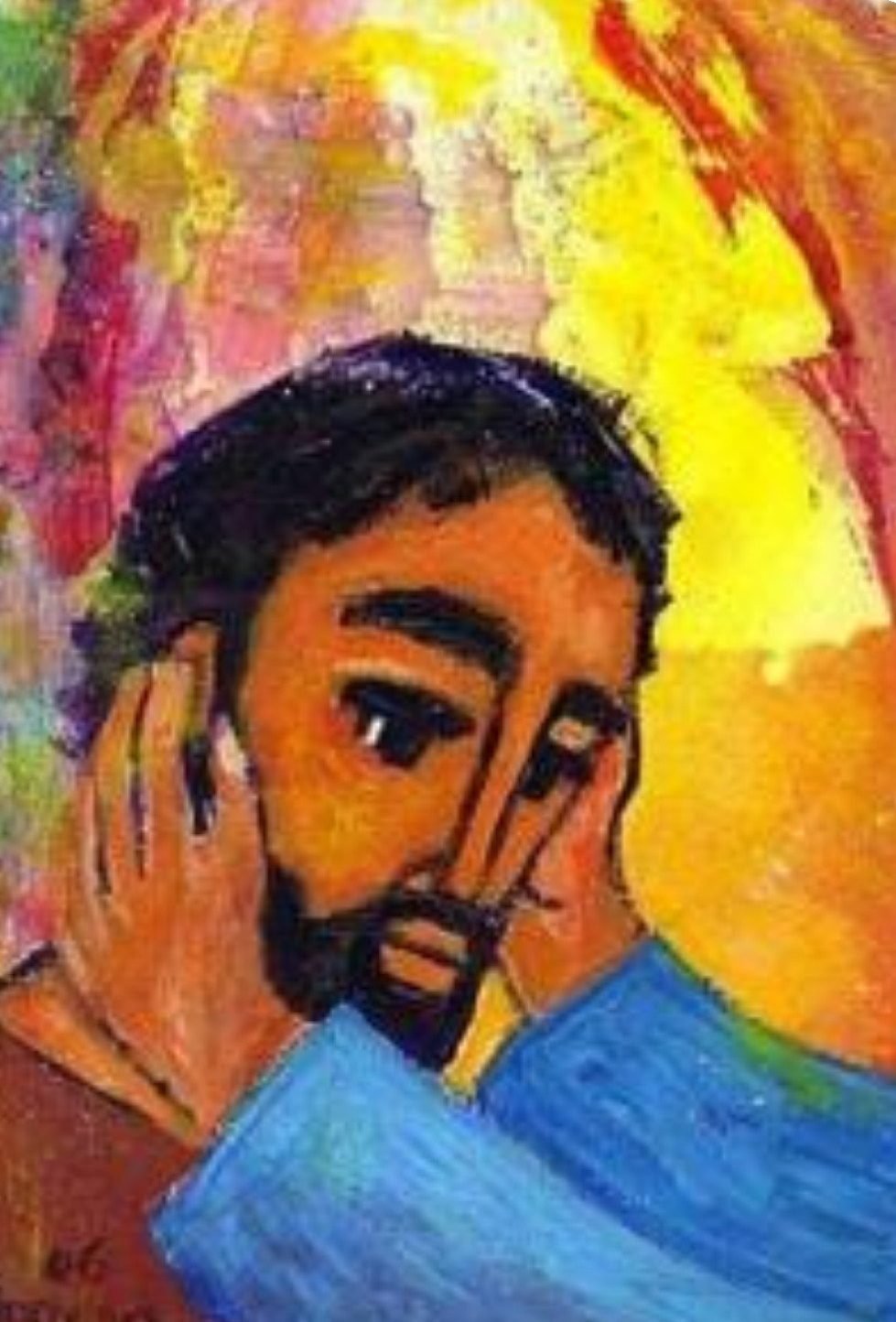
by f. Luis CASASUS, General Superior of the men’s branch of the Idente Missionaries.
Madrid, September 05, 2021. | XXIII Sunday in Ordinary Time
Book of Isaiah 35: 4-7a; Letter of James 2: 1-5; Saint Mark 7: 31-37.
1. There is a detail in today’s Gospel narrative that helps us to understand one of the essential messages of the three Readings: avoid prejudice and partiality.
In effect, St. Mark tells us that Jesus was traveling again in Gentile country, so he had gone there before, among the people whom Jews called “dogs“. He is reaching out to the despised and ignored who, as it turns out, are eager to hear him, while His own people had rejected his message.
The strength of the divine voice manifests itself where nothing seemed to anticipate it, in the most unexpected people and moments. In Isaiah’s poetic language: Streams will burst forth in the desert, and rivers in the steppe. The burning sands will become pools, and the thirsty ground, springs of water. God has used a variety of ways to gain our attention: the burning bush so fascinated Moses he couldn’t help but listen. For the desert wanderers it was a pillar of fire, a mobile cloud and some claps of thunder to draw them to Mount Sinai to listen to God. God’s prophets, in their attempts to get people to listen, danced, sang, told stories, and performed symbolic actions.
Ultimately God’s greatest attempt to be heard and heeded became flesh in the person of Jesus, the Word of God. And it is to reach out to all, the so-called righteous and the so-called sinners. Those we believe to be good and those we label as bad.
2. It is clear that another essential part of this Sunday’s Gospel message is our need to learn to listen better and better. Of course, Jesus is not talking about some technique to improve our attention, but he is asking us to separate ourselves from senseless thoughts and desires in order to listen to the voice of the Spirit. In the same way that he took the deaf and dumb man out of the crowd to heal him. That is the first step in our prayer of Recollection and Quietude: to avoid the noise of worldly thoughts and desires: beyond their moral qualification, they make us deaf to the Spirit.
In the book of Genesis we see how the devil first gets Eve and Adam to listen poorly. God had told Adam that he was not to eat of the fruit of the Tree of the Knowledge of Good and Evil, but the devil told them that neither were they to look at it, and they already had been viewing it with desire. He was roping them in and they had not paid adequate attention to what God had said even though their life depended on it.
3. If we put the two lessons together, we conclude that we must learn to listen attentively to the voice of God, manifested in every human being, whether with or without words. This is not an easy task. As M. Scott Peck (author of The Road Less Traveled) said, you cannot truly listen to anyone and do anything else at the same time.
Today’s gospel begins with a touch, a non-verbal message. Jesus touches one considered a sinner, led him away from the crowd, put his finger into the man’s ear, touched his tongue, looked up to heaven and said: Ephphatha.
We have experience of what is a touch of grace, in other words, a Charismatic Touch, which is produced when in some way we turn in common to God. For example, when we share our spiritual life in the Examination of Perfection. This occurs when we contemplate God’s action in our neighbor. Undoubtedly, we are called to be instruments of God’s work in our neighbor, which may occur in us consciously or not.
This is more powerful than contemplating a column of fire or listening to the echo sound of some thunder. The small gestures of generosity in people we sometimes judge mediocre or selfish, make me think that God expects much more from me, that being a sinner I have had the grace to know his will through the dedicated lives of many brothers and sisters.
Today, in the Gospel account, we are told that the deaf and dumb does not present himself to Jesus alone, but is accompanied by some people. By himself he could move on his own. He was not, in fact, in the same conditions of the blind man of Bethsaida who needed to be led by the hand (Mk 8:22-23). If Mark stresses this particular fact, it means that there is a message in it. To come to Christ and hear from him the word that heals, one must be accompanied by the testimony of someone, who has already known the Master and has experienced the saving power of his word.
Truly, it is the faith of the sick person, as well as the faith of those who accompany him and who bring him to Jesus, that allows the omnipotence of God to manifest itself and to be exerted. The following well-known anecdote illustrates this truth.
One day, as usual, an orphan, a little girl, stood at the street corner begging for food, money or whatever she could get. Now, this girl was wearing very tattered clothes, was dirty and quite disheveled. A well-to-do young man passed that corner without giving the girl a second look. But, when he returned to his expensive home, he’s happy and comfortable family, and his well-laden dinner table, his thoughts returned to the young orphan. He became very angry with God for allowing such conditions to exist. He reproached God, saying, how you can let this happen? Why don’t you do something to help this girl? Then he heard God in the depths of his being responding by saying I did. I created you.
Telemachus, a martyr whose self-sacrificial commitment to Christian ideals opened the blind eyes and deaf ears of the Romans and their fifth century Christian Emperor Honorius. According to the story, this Turkish monk was led by an inner voice to go to Rome in order to stop the cruel and inhuman gladiatorial fights between slaves. He followed the crowds to the Coliseum where two gladiators were fighting. He jumped into the arena and tried to stop them, shouting, In the name of Christ, hold back!” The gladiators stopped, but the spectators became indignant. A group of them rushed into the arena and beat Telemachus to death. When the crowd saw the brave monk lying dead in a pool of blood, they fell silent, leaving the stadium, one by one. Three days later, because of Telemachus’ heroic sacrifice of his own life, the Emperor decreed an end to the games. In today’s Gospel, which describes the miraculous healing of a deaf mute, we are invited to open our ears and eyes, loosen our tongues and pray for the courage of our Christian faith to become the voice of the voiceless.
In this Year, dedicated to St. Joseph, it is appropriate to remember the way he knew how to listen to the divine voice even in dreams and also, although he could not fully understand, to contemplate and accept God’s plans in Mary, for which he combined the knowledge of hearing with obedience and in his heart he chose to distance himself, to protect Mary’s honor and to burden himself with what people could interpret as infidelity to the Jewish custom of continence when they observed Mary’s pregnancy.
It is no coincidence that in Hebrew, the same word is used for “hearing” and “obeying,” because it was inconceivable that one could hear God asking something and refuse to obey. In Latin the same relationship is stressed. The word to listen is “audire” and to obey is “ob- audire”, which means to listen intensively, to hang on every word. Jesus wanted to heal our hearing so that we could act on what we’ve heard God say.
Jesus Christ came into the world to heal us and to help us resist the diabolical temptation. He wanted to change our hearing, our speaking and our heart. We see that in today’s Gospel. He healed the deaf mute’s hearing, so that he could tune into the God man’s voice. Then he healed his tongue so that he might speak to God and speak of God to others. To heal our hearing means to make it possible for us truly to obey God.
The irony is that the man who was supposedly deaf and dumb turned out to be the only one who could hear and act wisely. The others were the ones who were really deaf and dumb. They did not hear what Jesus instructed them. Jesus ordered them to tell no one about it, but the more he insisted, the more widely they published it. By announcing to others what Jesus had done, they thought that they were doing Jesus a favor when in fact they were helping the devil to diminish His ministry.
4. The Apostle James speaks today of discrimination against the poor. But it is a visible, frequent example of discrimination, to remind us that the poor are not only those without money, those who lack material means, but also those who personally seem to me unattractive, ungraceful, those who, for whatever reason, tend to be marginalized. This includes people who, because of their attitude or their difficult personality, I unconsciously consider unsuitable to make the kingdom of heaven known to them.
The Second Reading tells us that He, in fact, has chosen the poor of this world to receive the riches of faith and to inherit the kingdom. The poor are also those who have not been able, for whatever reason, to accept the graces, to begin a journey of conversion. But God’s plan cannot fail.
Let us remember again St. Joseph, who could not imagine how God had foreseen the role that Mary and he himself had been assigned in the redemptive mission of their Son. Let us remember the forgiveness that Jesus granted to people who were NOT going to change their perverse attitude, like Judas Iscariot himself. Only God the Father knows how our humble acts of mercy can and will bear fruit in anyone.
Everyone is worthy of our love because all have the love of God. Social standing, beliefs, relationships, etc., should not stand in the way of our love. That never means abandoning the message of Jesus about how to live. Rather it implies that because we know the teachings of Jesus and of his Church, we are able to love even better and to show others the path of life.
We know that if we get preachy, others will lose interest in the path of life. We know that if we do not live joyful and humanly rewarding lives, others will not want such a path. Our first preaching and apostolate is simply living the joy of the presence of Lord in every aspect of our lives and in the way we love others, thus creating, first and foremost, a bond of friendship.
Let us reflect on the words of the crowd when they said, He has done everything well. And may the grace of God always be with us so we will never forget the abundance of treasures that we have received through Jesus Christ and the power of His Spirit.












